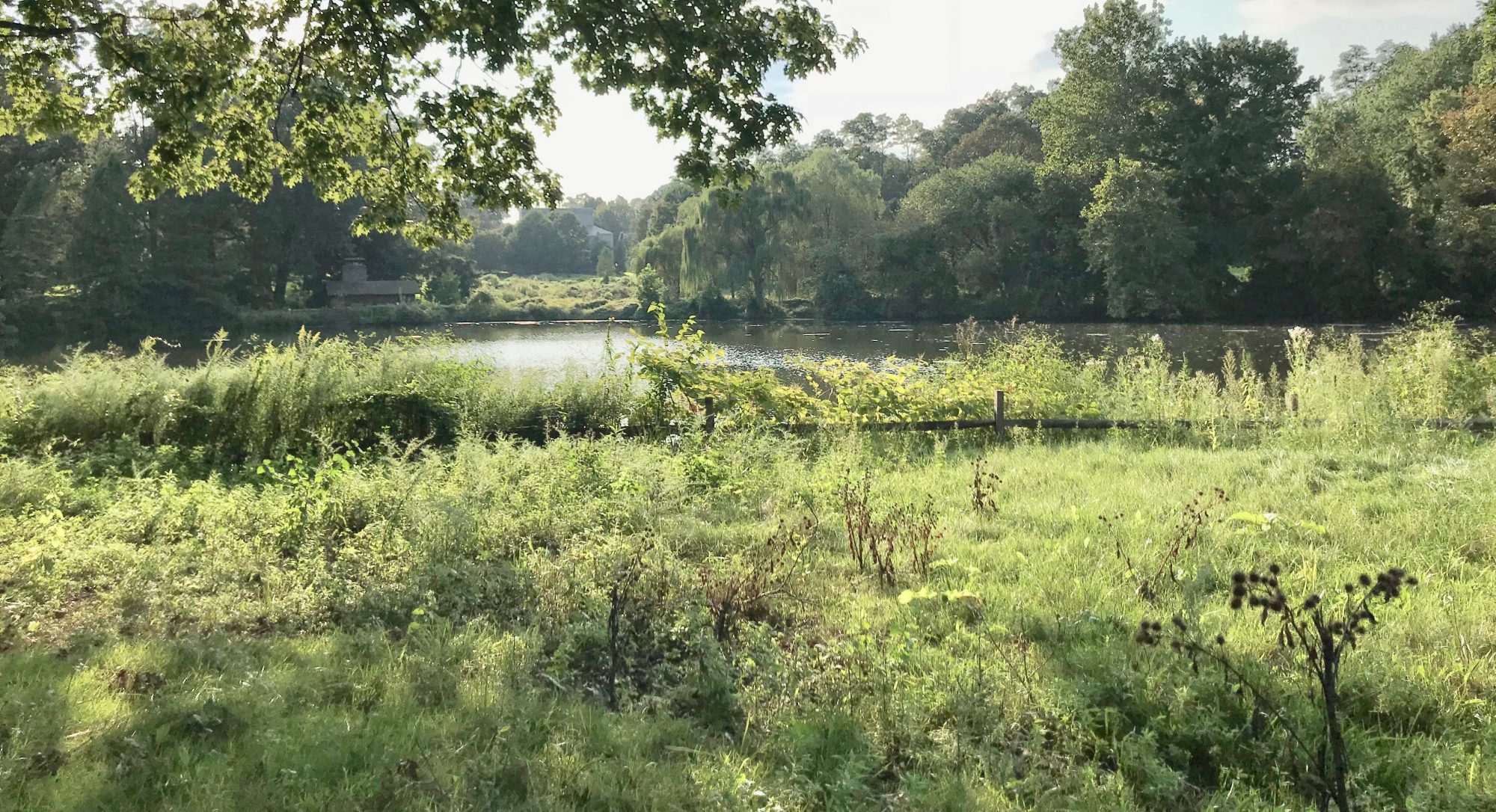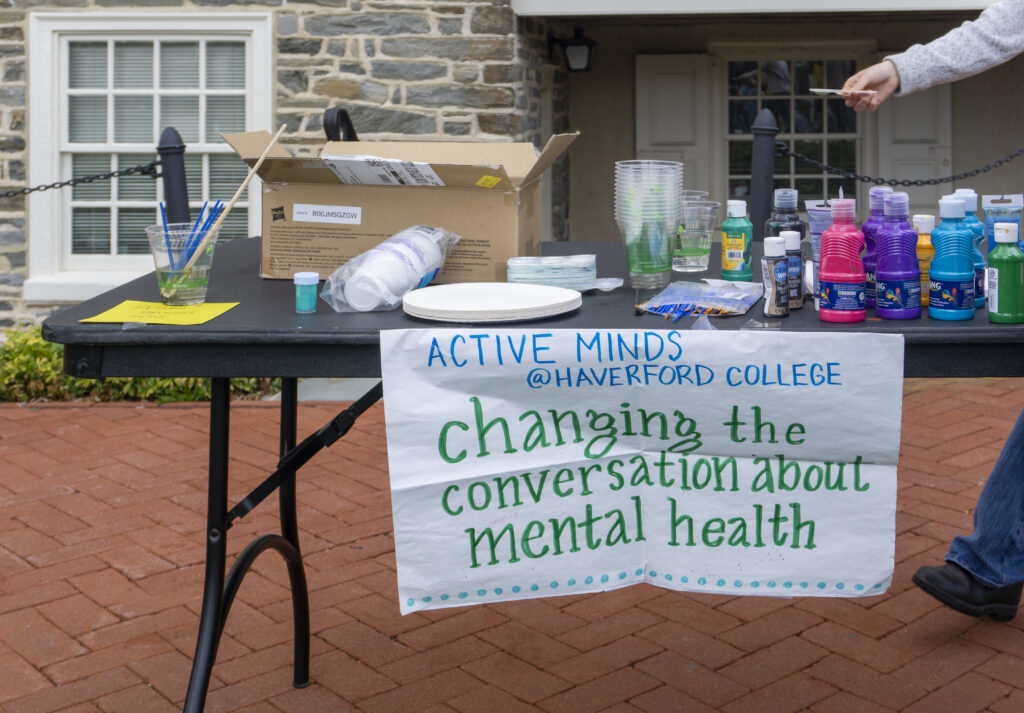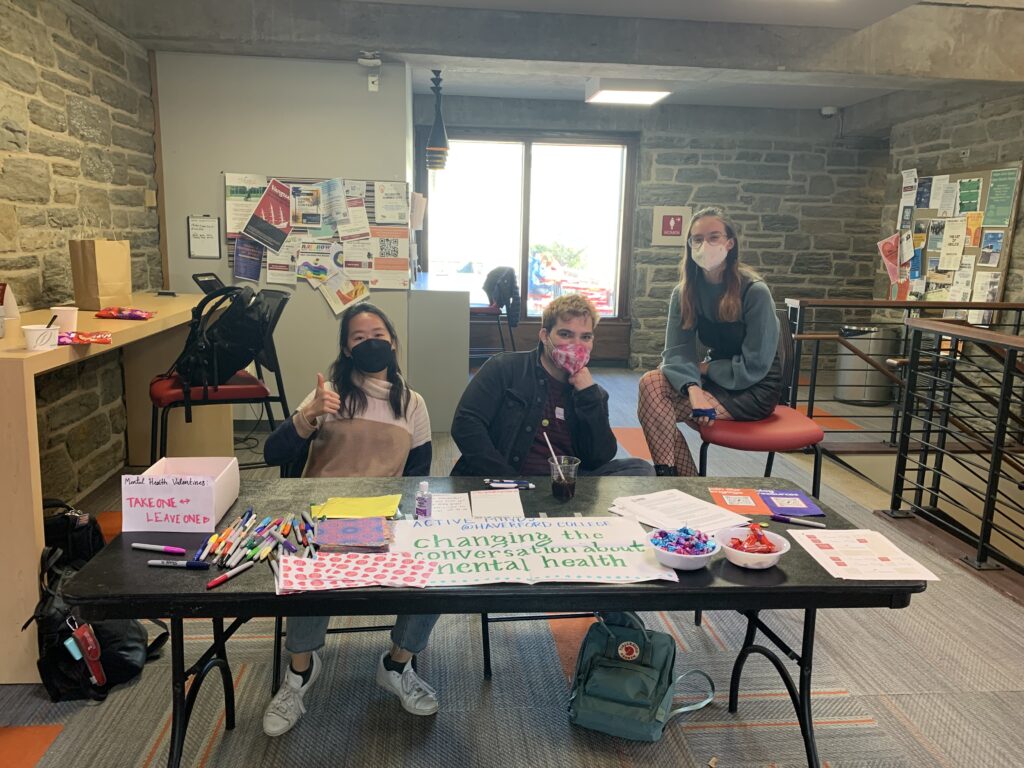Last Friday, Active Minds held its first-ever Sharing Our Stories event, where the club’s leadership read aloud posts from anonymous students about their experiences with mental health on campus. If you’re inspired to submit a reflection on mental health at Haverford, you can do so here, and we’ll add your words to this post! We hope that the Active Minds blog can act as an archive of student mental health experience at Haverford.
Trigger Warning: brief mention of self-harm. This is what your peers said:
“I struggle with social anxiety. Even when I am with close friends, I sometimes don’t know what to say to them. I experience bouts of social anxiety and awkwardness at unexpected moments. I will do the Irish exit when I feel overwhelmed by these emotions. They can make me feel very worthless at times.”
“How do conversations about mental health need to change so that people understand they are deserving of support and care even when they’re not actively in a mental health crisis? Other than therapy and peer-support what do those care options look like?”
“As someone who is very sensitive to stimulus (loud noises, bright lights, etc.) and has anxiety, parties are not fun. On the weekends (during non-COVID times) my sports team would often pregame together and then go to whatever party was happening on campus. I felt obligated to attend these events, at least sometimes – especially if we were dressing up as a team or something like that. When I would make myself go, it often ended with me having an anxiety attack, showing up in my friends’ apartment, and crying on their couch for a while. Then I’d go back to my room, feeling upset and disconnected from my team, and go to bed. The fact that these events revolve around alcohol and I don’t drink doesn’t help, either.”
“I have official ADS accommodations because of my depression. I am supposed to use that accommodation to make life easier for myself, to create another layer for support for when I’m struggling with my mental health. I rarely, if ever, reach out to professors about my official accommodations, even though I know how much they help me. I think part of this comes from an academic atmosphere (whether here at Haverford or at past schools) that pushed me to get things done at any cost, and to be the student that’s a “pleasure to have in class,” the student that doesn’t need any help and thus, it’s implied, is not a burden on the teacher or professor. I wonder a lot about what aspects of academic norms and environments would have to change for me to not equate see asking for much needed help as being a burden on someone. Is that as simple as changing expectations for attendance and extensions on syllabi? Does a discussion about support need to come from professors, from within peer-groups? I hope that folks think about and actively shift those expectations so people can be comfortable asking for help, and getting support even before moments of crisis.”
“Even as a graduating senior, I still struggle with a lot of imposter syndrome about being at Haverford. I come from a privileged background and no one has ever told me I shouldn’t be here, but I feel like I haven’t contributed enough to campus in the past few years. I know that living with mental illness has stopped me from being as outgoing or as involved as I wish I were. It’s difficult to let go of the regret and the feeling that someone else would have been a better Haverford student than me.”
“I wish Haverford had been more understanding of student stress and wellbeing before the pandemic. I appreciate how most professors have been flexible with deadlines and shifting assignments to meet students’ needs during the pandemic, but I am worried about what will happen once things go back to being somewhat “normal” again. As a first-year student, I remember feeling really stressed about deadlines and assignments, and I didn’t know asking for an extension was a thing. And I was worried that professors wouldn’t take me seriously if my reason for turning in an assignment late was due to stress, not only from assignments but also the other things going on in my life. I hope that we are able to have more open discussions around mental health in the future and that professors will still try to be accommodating after the pandemic, but I am not sure that is what is going to happen. Since we are in an academic space, I think professors and students sometimes fail to see each other as people with other things going on in their lives besides school. We are here to learn and grow as people, but that is hard to do in an environment that feels overwhelming and isolating at times. I hope that we can gain some positives out of the pandemic and be more open about discussing mental health and making accommodations for students in the future to benefit their wellbeing.”
“I’ve always had this feeling of not being good enough socially. It’s something that often gets reinforced at Haverford with how often I see people doing things together while I’m alone. I know that this is an irrational feeling, but it eats at me constantly and makes me feel lesser until I manage to find something else to think about.”
“One of the most positive things about being at HC is that I have been able to connect with other people who are neurodivergent and/or care a lot about mental health. It is so nice to know that if I’m struggling with something that I have people I can talk to without being judged. I often go off on tangents about things that I find incredibly interesting or amusing, but that most other people would probably not care about, and my friends not only tolerate it, but they engage with me and remember the random things I get excited about. It is so refreshing to be validated instead of seen as weird. I think it helps that many of them do the same thing.”
“I have OCD, and it can be so difficult not to get lost in my thoughts when all my classes are online. Even though I’m on campus this semester, most of the time there’s no reason to leave my dorm, and when I start obsessing and worrying about something there’s no excuse to snap me out of it. It’s difficult to spend so much time alone in my room because it makes my anxiety worse, and then I have more trouble finishing my schoolwork, and then it becomes a really vicious cycle.”
“Virtual learning has made it increasingly difficult to separate spaces associated with stress from those of comfort and home. I don’t think people realize how much compliments and kind words can really mean.”
“As a senior, it’s difficult to process and accept the fact that my last year at Haverford hasn’t been anything like I expected it to be. Most of the time I don’t even let myself think about it, because I’m afraid it will make me even more hopeless. I do know that ambiguous loss is a real thing, on top of all the more tangible loss and grief so many people have experienced. Losing more than a year of our “normal” lives, as messed up as that normal can be, is so destabilizing and sad. I can only hope that society will learn something lasting from all the lessons of the pandemic, and that work and school will be more accessible going forward.”
“I wish Havercrushes was more active because I think we could all really use more positive affirmations right now.”
“I have depression, which sometimes (well, often) gets in the way of my capacity to attend classes and to turn homework in on time. One thing I struggle with a lot is whether to disclose my mental illness with professors, and whether to be honest about taking “mental health days.” If I’m struggling with depression and cannot muster the energy to go to class, I’ll often lie and say that I’m sick, that I have a headache or stomach ache, because it’s still ingrained in me that that’s a more valid reason to not be okay, or that’s a more valid explanation for needing to rest. I’ve even sent emails like this to professors that I know well and that I think would be respectful of a mental health day, which tells me a lot about how little I value my mental health, and how much I fear other people devaluing it. I wonder what messages students can send each other and what professors can send their students so that mental health days become more acceptable and feel like a valid option (?).”
“In their official, legal capacity, CAPS can often only provide support to someone if they are at risk of harm in the present moment. I wonder what other resources, systems, etc. are available or could become available for people to use before and after moments of emergency so the support is more consistent or more long-term.”
“Not having the opportunity for casual, unplanned interactions with other people has disrupted my mental health during COVID. I miss running into people as you’re walking between classes, and sitting with random people you haven’t seen in a while at the Dining Center. Even though I’m lucky to live with great friends this year, not having all those consistent, casual interactions makes the campus feel much smaller and much more isolating than it would be otherwise.”
“I have a lot of trouble focusing and motivating myself, probably because of undiagnosed ADD. Even though I see the signs of ADD in other family members and I relate to friends who have it, it’s so difficult to feel valid without having an official diagnosis. To anyone out there trying to validate and understand their struggles with mental illness/neurodivergence–– it’s not just you. Even when I know that it’s capitalism making me feel like I have to be productive all the time, it’s tough to stop feeling guilty. But I know that I would never judge my friends who have trouble getting work done because of mental health problems. We shouldn’t judge ourselves, either.”


